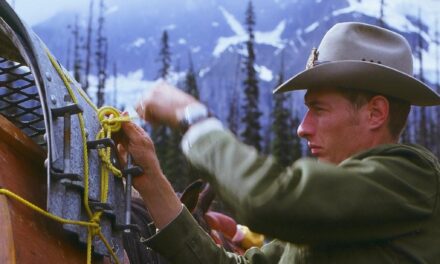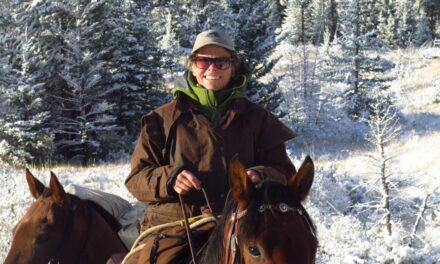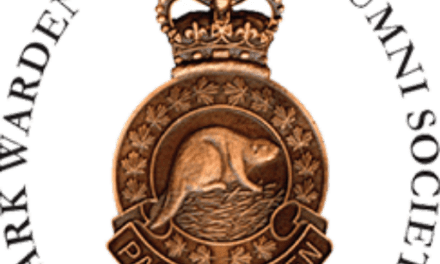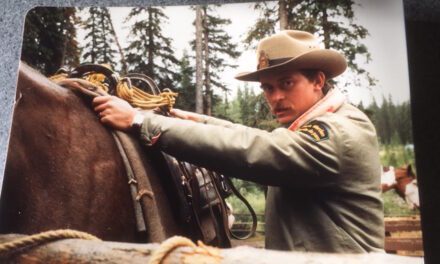Thank you to the Whyte Museum of the Canadian Rockies for granting permission to the Park Warden Service Alumni to post this interview on our website.
This Oral History interview was funded in part by a research grant received in 2019 from the Government of Alberta through the Alberta Historical Resources Foundation.
Park Warden Alumni Society of Alberta
Oral History Project Summer 2019
In Person Interview with Glen Peers
August 23, 2019 – 11:00 am, Invermere, BC
Interviewed by Susan Hairsine
Place and date of birth? Glen was born in 1951 in Montreal, Quebec
(Tape August 23 – 11:14 pm – Tape 00:20 seconds) Part one.
SH: Where did you grow up?
I grew up in Montreal for the first 18 years of my life. Like so many 18 year olds, I was a skier. I started skiing when I was 14, and my father had a good friend that lived in Medicine Hat, actually a navy buddy, and actually he always wanted to move to Alberta. My father actually was a skier, back in the day, in the Laurentians, north of Montreal and all of that stuff. So my father introduced us, a little later, like I was 14, but I just got right into it. So when I finished high school I went to college, but really just wasn’t into it, I really needed to leave. So that’s when I came to Banff. I got a job at the Banff Springs Hotel as a lifeguard. That was my first job out in western Canada. That was back when, you know, CP is still a national company obviously, but I applied for the job in Montreal, and got it there, and they actually paid your way out (west), because part of the issue was how do they keep staff, even back then. So the incentive was if you stayed all summer you got your way paid home again.
So I worked at the Banff Springs Hotel as an 18 year old kid. In the middle of the summer, I don’t know how I hooked up with a few people, but I clearly remember going into Monods, back then, whenever that was, 1970 or something, 71 or something like that… and I rented a pair of Head 360 skis. This was in July, and I hooked up with a few people. And they were going up to Bow Hut. I figured, “Damn I’m going to go skiing in the summer time!” So I carried those skis up there, had no idea what I was doing and we went skiing in July. We hiked like in the middle of the night to get up there and I clearly remember jumping over an open crevasse. Not a big one, like about two or three feet thinking that this is just great, and (I was) inches away from being another statistic basically. And that was basically it. I didn’t get home for Christmas for nine years after that. Stayed and then did a bunch of other stuff. I just didn’t have any interest in being in the city, or the suburbs actually and I figured okay, I’m going to stay out here. So I’d gone back to school in the fall, and then left and quit.
SH: So you went back to school in Montreal?
Glen: Yes, and then I came back almost right away, and got a job. It was the first winter that the Banff Springs Hotel was open in the wintertime. It was 1971 I think. I don’t know. Is this relevant stuff?
SH: Well no, that’s fine. At some point you got to tell me when you went to Warden school and where you went. (Tape 04: 25)
Glen: So a quick recap of all of those years. I got a winter job as a lifeguard in Banff, and there were two of us. The other guy that I worked with, he was saving his money, he was just a young guy like me, he was saving his money and he was buying a motorcycle in Europe, and he was going to travel by motorcycle in Europe. So he was working like crazy and had two jobs, and he was a taxi driver at night. So he wanted all the day shifts and I figured perfect, I’ll work all the night shifts, the evening shifts and I skied, and I clearly remember paying $55.00 for a seasons pass at Norquay. So I skied a bunch and did that.
SH: Excellent. I like that. So then you are being a ski bum and working as a lifeguard and so how did you..
Glen: The transition to? So I got to brush the cobwebs out. So then I did that for a couple of years and I ended up, I got a bartending job. So I did that, and that was another one of those ‘work in evening and ski during the day’, right in downtown Banff, at the Mount Royal Hotel. Anyway I did that and then of course, meet girls and all that sort of stuff and went to New Zealand with a girlfriend. That was for like eight months, so we left, I think in October, and came back in May I think. Hitchhiked around New Zealand and went to Australia, that normal stuff. And then when I came back it was like “Oh, what am I going to do for a job?” And we did a bunch of hiking at Mount Cook and stuff. (Tape 06:50)
So I came back and went down to Kootenay National Park and it was just the luck, it was Mayish and I went in just looking to apply for a job. Maybe as a lifeguard at the hot pool or whatever. And they were starting, I think they had run it for a year or two, but they had something called a Conservation Corps. And I talked to … Stevie Coy, was there as the HR (Human Resources) person, which I’m sure they didn’t call it HR back then. And I met her then and she said, “Well you need to go talk to the Chief Park Warden.” At that time it was Neil Woledge. And that’s why I was thinking about this whole family tree thing … it’s a generational thing. So talked to him, and I just said “ I just got back from an eight month trip”. And we were doing all these things in New Zealand and stuff and you know, because I had lifeguard stuff with the first aid and I had worked with young people, he said, “Well actually we have this job with Conservation Corps.” And at that time there was one in Jasper that was all male, there was one in Waterton that was all female, and the one in Kootenay co-ed. It was eight young men and eight young women. The idea was, this was the Trudeau/Chretien era, they were big on this. Passing this stuff
SH: Kind of like Katimavik?
Glen: Exactly, very similar. The idea was you get the kids in Grade 11, graduated from Grade 11 and going into Grade 12, so career pathing sort of. Give them an introduction to Parks Canada, in that last summer and then they are going back to their senior year. Introduce them to all aspects – they worked with the Warden Service, they worked with the trail crew, interpretive, they worked with road crews, so it was just the whole kind of thing and I was one of the supervisors. There were three of us; there was a supervisor and two foremen. So I started as a foreman for year. You know who else ended up doing it? Debbie Browne, Bill Browne’s wife. I ended up being the supervisor there. I did it for four or five years, I think five years in the summers, then went back, but at that point I realized. It was also an introduction to Parks Canada for me with the Warden Service. Gord Watkins was a seasonal warden back then.
SH: I didn’t know he was a warden.
Glen: Ya, so that was as much as an introduction to Parks Canada for me as these kids and so we hiked all over the place with them and took them to all of these working assignments and stuff. They worked with trail crew.. They worked with Cecil Cooper who was Lance Cooper’s father, he was the foreman for the trail crew here. He was great. I don’t know if you know the history there but he, during WW2 – he may have even been in 1 and 2 – but in WW2 he was a pilot and had a crash and had half his face sort of burned. And he always wore dark glasses. I don’t know if he had loss of vision in one eye or something. But he was the first guy that I ever, like these kids were 16-17, lots of energy. And I always remember one the things that he would say, you get these kids there, and he enjoyed it, but he just always said, “Just relax, calm down, it’s all pensionable time.” That’s the first time I ever heard that. (Tape 11:07)
SH: I used that one quite a lot. Laughs
Glen: So I did that and quickly realized that’s what I want to do … I want to ride around on horses and do all of that other stuff so then went to school in Lethbridge. And I was never a good student, and you know just made it by, and then it was finally a click. And I ended up getting a scholarship and stuff and it wasn’t hard just simply because I liked it. It was just as simple as that. But I got some credits for going to school, college in Montreal, so I was able to speed it up and finished a semester early. So I’d finished school in January, at Christmas time, so where do you get a job then. So I ended up as a liftie at Norquay just for the rest of that winter. And then I think it was at that point…. I did the Conservation Corps, the guy that was the supervisor left, so I got that job and then the whole program disbanded after that. So I did five years there and that’s when I finished a summer as conservation corps, didn’t have anything lined up for the winter but at that point I knew all of the guys: Hans Fuhrer, Brian Sheehan, all those guys were in Kootenay and we all got along, and so I got this job in the Warden Office. I don’t know what you’d call it now, like a conservation clerk or something. I did a bunch of drafting stuff, that’s when Hans was writing his climbing guide to Kootenay National Park. So I did a whole pile of, back in the day, like in Rogers Pass, the letterset stuff, printing and doing all of this stuff. So I did a bunch of that in the wintertime. So then I applied for Warden Service (late 70s) and got a term job in Jasper as a Warden. And that was back when competition was huge, really big, and so I got a term job, and worked at Poco (Pocahontas Warden district) in Jasper with Rod Wallace. Rod was the guy that actually, you know, here’s your typical eastern kid – you know which end of the horse do you back up to the gas tank kind of thing, so he was terrific as far as his patience and showing me stuff, so at the end of that summer I did some fall boundary patrols at Fiddle River and stuff so that was pretty neat. And then through that summer/fall I applied for SRAWS in Rogers Pass. SRAWS is Snow Research and Avalanche Warning Section. Got an interview and got a job with Fred (Schleiss).
SH: Did you have avalanche skills at that point?
Glen: No, no, lots of skiing and enthusiasm. I had done a bunch of reading and stuff but no, I never.. so went and did the interview and I remember getting in the snowcat with a number of other candidates, going up to Mount Fidelity and they put 20 pounds of salt in everybody’s pack, and said, “Now we are going to go for a ski.” Anyway, through the interview and the ski test I got a job. I remember one of the questions… Fred Schleiss was sitting over there and he says, one of the questions was how does snowflakes form? What he was after I found out afterwards because I had no idea, was the there was basically a microscopic piece of dust, which was the seed of the snowflake which was kind of what he wanted. Anyway, I got the job and so through that winter there I was offered a seasonal job in Pacific Rim with the Warden Service.
SH: Summer seasonal? Glen: No, because I was a warden before I worked for Fred so I got them reversed there. So I basically had the best of both worlds. I had a summer job… so the first summer I went out to Pacific Rim, and it was all mountain guys out there, that were there. Gord McClain, was one of the senior wardens …
SH: Pengelly was there.
Glen: He wasn’t there, he had just left because I never worked for Ian there but the old western warden, he was the Chief Warden? SH: Mac Elder?
Glen: Mac Elder was the Chief Warden there. So the first summer I was the typical patrol person on Long Beach. That was back when I think this park is still not gazetted, it’s still a reserve, so you didn’t have any enforcement abilities. This was also before there was a Warden school. There was lots of short one week training courses but there wasn’t a ‘go away’ – it was all learn on the job. So the first summer I did that and went back to Rogers Pass. That’s when I worked for Fred for the winter. There was an interesting relationship between the SRAWS guys and Warden guys which you are aware of. Anyway I got a job with SRAWS, that’s how it worked. (Tape 18:32)
I was on a ride with friends and we were driving up to K Country and it came up that I worked for Freddie and one guy said, “Really. Was he really as cantankerous as everybody said he was?” And I said, “Oh ya.”, but I said, “You know what, I got along quite famously with him.” And he said, “ Why? And I said, “You know why I think it was? I had good hand printing.”
SH: That was key (Tape 19: 20)
Glen: It was absolutely key because when you were up on Fidelity, that was back in the day where you had this big blueprint, and it was a time profile. The whole winter’s snowpack, all in black India ink, and it was a repeatograph, and if you screwed up you had to start over. It was just insane. And you know what Fred was like. His weather plots you had to stamp the little trails down with the snowshoes. Everything had to be right angles, you couldn’t just sort of wander off, and that was… Chris Turner worked there, Steve Steve O. (Thomas).
SH: The guy that died.
Glen: Ya, what was his last name? (It was Steve Thomas) SH: The one who’s dog ran across the plot
Glen: I was there when he did that. And he just came in and said, “ I guess I resign, because I had my dog up there and he ran right through the middle of the weather plot.”
So anyway, I worked for Fred and then went back to Pacific Rim for a second summer, and that summer I got to be the district warden out in the Broken Group Islands, which was really, really neat, as far as, you did all your work by zodiac. You lived on a float, a little panabode cabin on a float. So I spent the summer counting bald eagles, stellar sea lions and eating fresh prawn salad and crab. It was a pretty neat experience but I was also …. that was back at a time when for young guys, you needed mountain experience. That’s where I wanted to be and that was when people …. Gord Irwin worked out there too and everybody was a little paranoid about (am) I going to be cut off from the rest of the world and I am not going to be gaining the experience the rest of these guys are getting. So how do you do that? (Tape 21:40)
But, I was lucky that my winter job was right in the thick of it in Rogers Pass. So at least I had that connection back and forth. So that went on .. summer seasonal and winter seasonal and then I went for a permanent competition. Did pretty good, I think there was about 1200 people in the competition and I was in the twenties or something. At that time I had started to accumulate experience and I’d gone to Lethbridge and done well at school and all that stuff and very specific, actually I remember talking to the school administrators. At that point Parks Canada had a relationship with LCC (Lethbridge Community College) and had some influence over the curriculum for people who were going to come into, not just the Warden Service, but Parks Canada.
So I just sort of asked myself, so what is it that I needed at that time to go and get this job and that’s what I did. And then, something that I’ve always regretted, some of my classmates they went to Montana, and you were given the credit for the two years, and you could have just jumped into third year, and I should have done that, and I always regretted not doing it, but I got the job that I was after. It was away to the races after that as far as getting experience and so on. So I had my second year in Pacific Rim, I had gone through a competition and I remember, you know Dan Vedova don’t you?
SH: Yes
Glen: I clearly remember we were all on a list. I was actually ahead of him on that list. So anyway, before I finished my second year out in the Broken Group Islands I was offered a fulltime job.
SH: And that was in Rogers Pass?
Glen: That was in Rogers Pass. And I remember being in the surf, on surf boards, might have been a school, maybe just for fun, and Dan Vedova was in there. We were standing beside each other, just going in and he said, “It’s all over for you baby blue”. In other words I got the job so didn’t have to go through all of that process. That’s an absolute quote. And it’s a song, I can’t remember what the song is from, but he meant it as a good thing. (End Section 1 Tape 24:44)
Glen Peers – Part 2 – 11:39 – 00:23
SH: So, how did you become involved in the Warden Service? Which national park did you start working in? We sort of have been covering that.
Glen: So it was Kootenay, then Jasper, then Pac Rim and Rogers Pass. Then I got my full time job in Rogers Pass, and I believe that it was literally Ian, (Pengelly) didn’t have a full time job there but he was seasonal and then he came to Banff. But I moved into that seasonal job in Rogers Pass for two winters as a warden. So I did one winter with SRAWS, and then I did two winters as a seasonal warden and I did two summers at the same time; the Pacific Rim summer stuff. And I was usually able to get extensions and stuff so it all worked out pretty good. I remember, Janice and I were building a house in Spur Valley and I remember having to take nine days off in the middle of the summer in July, and blasting back here and putting the roof on the thing. And then driving back, because she was here working at the Hot Pools. So then I got the full time job in Rogers Pass and did it like a year and a half straight.
SH: That’s when I was there.
Glen: Ya, that must have been right at the end because you were there when I left there to come to Banff and that was in ‘83.
SH: Ya I was there in 81.
Glen: Yes, okay so that’s right then. So we would have had probably two winters together and then I got the transfer to Lake Louise. But just before that transfer there was an opening, and it would have been (Earl) Skjonsberg as the dogmaster that retired? And then Scott Ward became the dogmaster. Well I was quite interested in that. And, I applied and I got accepted and they sent me to quarry training, that’s what it was called, with the RCMP. So I went to Innisfail and basically became bait for the dogs for two weeks. Scott did it as well, cause Scott had been in Pacific Rim too, and then he came back. Anyway you basically just ran and hid behind big round bales, and did tracks for them and there was usually a bite at the end of all of this stuff. And it was quite enjoyable, it was fun. And I finished that and they said, you qualify. And I remember talking to Keith Everts and he just said, “Scott’s there and he’s got more seniority, I’d take both, either one of you, but Scott’s already here and he got the job.” But I got a transfer to Lake Louise so I was totally fine with that. (Tape 3:39)
So then I had a full time job and for that first summer I lived and shared a trailer in trailer town there with Terry Skjonsberg, but he was in the backcountry. Then for the winter, this was definitely in 1983, Janice left her job – she was a supervisor at the pools here in Radium – and she got, that was when the Sally Borden building (in Banff) and the aquatics centre was just being finished. There was a job opening for an aquatic supervisor, and Janice got it. So that first winter we lived in a little government house on Squirrel Street in Banff. I remember it being so cold we had plastic on the windows. Then we got… Bill Browne and Debbie Browne moved, I think from the Castle house down to Kootenay and we moved out to Castle (Junction).



